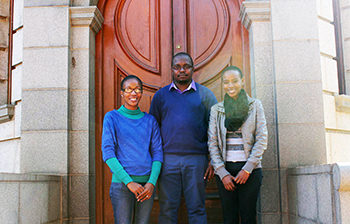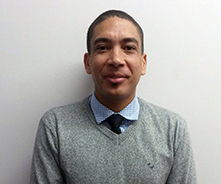Latest News Archive
Please select Category, Year, and then Month to display items
29 March 2022
|
Story Teli Mothabeng
|
Photo Supplied
![]() Philmon Bitso, Student Recruitment Officer, with the top-10 cohort of the class of 2021 Free State Star of Stars.
Philmon Bitso, Student Recruitment Officer, with the top-10 cohort of the class of 2021 Free State Star of Stars.
The Department of Student Recruitment Services at the University of the Free State (UFS) hosted its annual Free State Star of Stars competition at the Amanzi Private Game Reserve during the first week of March. The event saw some of the brightest young minds in the Free State inducted as UFS first-year students into this year’s top-10 cohort for the competition. This marks the first Star of Stars event since the beginning of the COVID-19 pandemic.
.jpg?Status=Master&sfvrsn=d7324e20_1)
This new cohort consists of a dynamic group of academically gifted students from Quintile 1-3 schools in the Free State who are currently enrolled for different UFS academic programmes, ranging from Medicine, Law, Education, and various Bachelor of Science courses. Many of these students had to overcome insurmountable challenges to perform as well as they did in their Grade 12 academic year and to become part of the top-10 cohort for the class of 2021. Due to the COVID-19 pandemic, the Department of Student Recruitment Services was forced to take a different approach to celebrate these deserving students; consequently, a weekend-long induction camp was the substitute for the annual gala dinner.
Apply for the 2022 Free State Star of Stars competition
The UFS realised the need to establish a platform that recognises and celebrates the diverse and, in most instances, difficult circumstances that disadvantaged schools (Quintile 1-3) are facing. Consequently, the Star of Stars competition was developed and established in 2016. This competition provides disadvantaged Grade 12 learners from all districts in the Free State an opportunity to showcase their excellence, while motivating them to aspire to achieve more.
nGAP lecturers welcomed by the UFS academic community
2016-06-30

University of the Free State’s newly-appointed nGAP
lecturers. From the left, Neo Mathinya,
Phumudzo Tharaga, and Kelebogile Boleu.
The University of the Free State (UFS) was allocated six positions as part of the Department of Higher Education and Training (DHET) New Generation of Academics Programme (nGAP). Four candidates have filled positions in the Faculty of Health Sciences, Faculty of the Humanities and the Faculty of Natural and Agricultural Sciences – with two positions still vacant.
According to Minister of Higher Education and Training, Dr Blade Nzimande, nGAP is part of the Staffing South Africa's Universities Framework, which focuses on the expansion of the size and compilation of academic staff at South African universities, especially with regard to transformation. The focus of the programme is the appointment of black and coloured candidates as well as women.
The Department of Soil, Crop, and Climate Sciences in the Faculty of Natural and Agricultural Sciences welcomed two nGAP lecturers, Phumudzo Tharaga and Neo Mathinya. The Faculty was allocated four positions. Two positions are filled, while two positions in the Department of Animal and Wildlife Sciences are almost ready to be filled with exceptional candidates.
Agrometeorologist with his feet on the ground
Phumudzo Tharaga holds an MSc from the UFS, and is currently pursuing a PhD. Tharaga’s research focuses on quantifying the water use efficiency of sweet cherry orchards under different climate conditions in the Eastern Free State. Tharaga will offer his students a wealth of practical experience, which he began accumulating while working at ABSA as an agro-meteorologist, before moving on to become a senior scientist at the South African Weather Service. In 2015, Tharaga became a research technologist at the Council for Scientific and Industrial Research (CSIR) and then returned to the UFS as an nGAP candidate at the beginning of 2016.

Beynon Abrahams, nGap lecturer
at the Faculty of Heath Sciences
Department of Basic medicine
Motivated scholar turned academic
Neo Mathinya, who hails from Taung in the North West, has made the UFS her home. She received both her undergraduate and honours degrees from the university. Apart from joining the department as a lecturer under the nGAP initiative, she is currently studying for her MSc in Soil Physics. She will continue with this research when she comes to her PhD. Mathinya’s research focuses on soil salinity - the process of increasing salt content - which affects the ability of plants to take up water, a process, known as osmotic stress. She will investigate the effects of irrigation water salinity on the grain yield and quality of malt barley.
Researcher with a passion for crime prevention
Kelebogile Boleu joined the Department of Criminology in the Faculty of Humanities, with a fresh take on diversion and crime prevention. Boleu holds a BA Criminology (Hons) and is now pursuing her Master’s degree. She worked for NICRO a non-profit organisation specialising in social crime prevention and offender reintegration, with programmes that prevent young and first-time offenders from re-offending, thus reducing crime. Boleu said that her practical experience makes her lectures to third-year criminology students exciting. Boleu’s research focuses on analysing the value of pre-sentencing reports in assisting adjudicators to make well-balanced judgments in cases.
Research with a winning plan for fight against breast cancer
Beynon Abrahams joined the Department of Basic Medical Sciences in the Faculty of Health Sciences. Abrahams holds a BSc, BSc (Hons), and MSc in Medical Biosciences from the University of the Western Cape. Abrahams’ Master’s research focused on breast cancer, research on which he is building in his PhD. This doctoral research involves the exploration of P-glycoprotein, a protein expressed on cancer cell and responsible for multi-drug resistance in cancer treatment. The aim of this research is to develop a therapeutic drug treatment strategy that will improve breast cancer patient survival outcomes. Abrahams’s greater vision is to look at conventional cancer therapeutic regimens, to find ways in which they can be improved.
The nGAP initiative offers these young lecturers an opportunity for growth and development as academics, while providing them with opportunities they would have not have been exposed to otherwise.